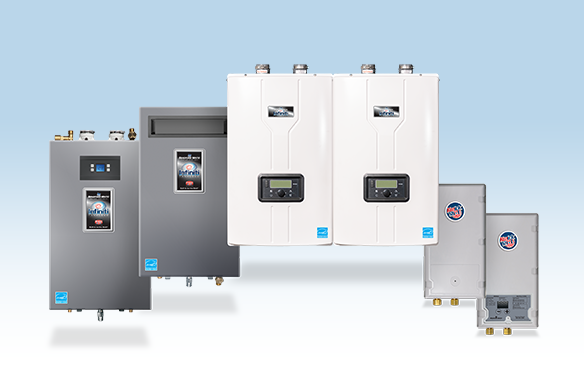When Tankless Water Heaters Boost A Home’s Benefits
When Tankless Water Heaters Boost A Home’s Benefits
Blog Article
In this article down the page you will find lots of dependable material in relation to Unveiling the Hot Trend: The Benefits of Tankless Water.

In a globe where ease and performance preponderate, it's no surprise that home owners are regularly on the lookout for smarter methods to handle their home's energy consumption and convenience. One technology that has actually progressively gained appeal is the tankless hot water heater. However what exactly makes these systems attract attention from the traditional tank-based designs most of us matured with? Let's dive in and check out the advantages of tankless water heaters, aiding you choose if it's time to make the button in your house.
Introduction
Image this: you step into the shower after a long day, anticipating a relaxing waterfall of hot water, just to be welcomed by icy beads due to the fact that the last individual utilized all of it up. Audio acquainted? Conventional water heaters store a fixed amount of warm water, indicating you go to the mercy of that container's supply. Tankless systems, on the other hand, heat water as needed. No more running out mid-shower, no more wrestling with schedules just to make certain hot water is available.
Understanding Tankless Hot Water Heater
What Are Tankless Hot Water Heater?
Tankless water heaters, in some cases known as on-demand or instant hot water heater, give warm water just as it's needed. As opposed to keeping gallons of pre-heated water, these units kick right into activity the minute you switch on the faucet. Water goes through a warm exchanger, heating up in real-time, suggesting you obtain a nonstop flow of warm water without the requirement for a large storage tank sitting idly by.
Just how Do They Differ from Typical Solutions?
Typical heating units hold a storage tank of hot water, utilizing power to keep that tank at a constant temperature level. Tankless units get rid of the standing supply, reducing lost power and the large footprint of a huge cyndrical tube. Basically, you're updating from a "stockpile" mindset to a "made-to-order" approach.
Typical Kinds Of Tankless Units
Tankless hot water heater normally can be found in 2 ranges: gas and electrical. Gas designs have a tendency to provide greater circulation prices, suitable for larger families, while electric designs usually serve smaller sized homes and are usually easier to set up. Additionally, some systems are created for point-of-use (offering one fixture) while others can take care of the entire home's warm water demands.
Key Benefits of Tankless Hot Water Heater
1. Endless Warm Water Supply
Ever before needed to schedule showers so everyone gets their fair share of warm water? With tankless, that comes to be a thing of the past. As long as the heating system's flow capability isn't exceeded, you can take back-to-back showers without becoming a popsicle.
2. Energy Effectiveness and Expense Financial Savings
No more heating a titan tank's well worth of water and maintaining it cozy all day. Tankless heating systems reduce standby energy losses, which can reduce utility bills. While the preliminary expense could be greater, the long-lasting savings usually warrant the investment.
3. Space-Saving Design
If your home is short on storage space, getting rid of the bulky tank liberates useful space. Tankless units are portable and can typically be mounted on wall surfaces, tucked away in corners, or installed in limited utility closets without hogging the entire room.
4. Longer Lifespan
A well-maintained tankless hot water heater can outlive its tank-based relative. Standard storage tanks might last 10-15 years, while tankless designs can keep downing along for 20 years or more, making them a strong investment over time.
5. Improved Water Top Quality
Storing water in a tank can occasionally lead to sediment accumulation or a slightly "off" preference. With tankless systems, fresh water is heated up on the spot, reducing the possibilities of sediment buildup and possibly supplying cleaner-tasting water.
Factors to consider Before Changing
Though the advantages are compelling, it's wise to take into consideration a few aspects prior to totally committing.
Initial Investment Prices
Tankless heating units normally include a higher in advance cost. Between the system itself and prospective installment adjustments, the first expense could provide you sticker label shock. But bear in mind to view it as a long-term financial investment.
Installation Needs
Depending on your home's facilities, you could need extra electric ability or gas line upgrades. Guarantee you understand the setup needs and talk to a specialist to stay clear of shocks.
Assessing Your Home's Water Use Patterns
If your household simultaneously utilizes several fixtures with high hot water need, see to it the device's flow price satisfies your demands. Understanding your usage patterns aids you select the best size and kind of tankless heating system.
Maintenance and Care Tips
Tankless systems are fairly low maintenance, but they aren't set-it-and-forget-it devices.
Routine Cleaning and Descaling
Tough water minerals can develop in the warm exchanger, influencing performance. Normal descaling (often recommended yearly) maintains the unit going for peak performance.
Yearly Professional Inspections
A yearly checkup from a professional guarantees minor problems are captured early. They'll evaluate the unit's efficiency, try to find leakages, and aid preserve ideal performance.
Guaranteeing Correct Air Flow
For gas models, proper ventilation is important to securely get rid of exhaust gases. Make certain airing vent systems are tidy and properly set up to avoid any type of prospective security dangers.
Contrasting Different Brands and Versions
Not all tankless hot water heater are produced equivalent.
Looking Into Reliable Manufacturers
Seek reliable brand names with a background of creating high quality units. A dependable supplier usually supplies better consumer assistance and longer warranties.
Checking Out Reviews and Customer Responses
User evaluations and feedback from neighbors or friends that have actually gone tankless can use valuable insights. Occasionally, real-life experiences can be extra telling than advertising and marketing brochures.
Setup: Do It Yourself or Specialist?
While some property owners delight in dealing with jobs themselves, tankless installation might not be the best time to break out the toolbox.
Advantages and disadvantages of DIY Setup
A DIY install could conserve cash, but it includes risks. Inaccurate installation can lead to ineffectiveness or safety and security worries. If you come in handy and have experience, it might be feasible-- however proceed with care.
When to Call a Specialist Plumbing Professional
For most, calling a professional makes sure whatever's done correctly. An expert plumber comprehends neighborhood codes, sizing demands, and airing vent parameters, minimizing the threat of incidents.
Taking full advantage of Performance
You have actually invested in a tankless system-- currently optimize its efficiency.
Optimal Temperature Settings
Lots of people set their devices between 120-140 F. Adjusting the temperature can improve convenience and savings. Experiment to locate a sweet place that does not squander power.
Pairing with Low-Flow Fixtures
Wish to extend your unit's capacities? Think about mounting low-flow showerheads and faucets. They minimize water use, allowing your tankless system to deliver a stable stream of hot water without straining.
Environmental Impact
Tankless water heaters straighten with greener living objectives.
Lowered Carbon Footprint
By using much less energy and only home heating water as required, tankless systems can lower your home's carbon impact, reducing your environmental effect.
Saving Natural Resources
Much less power consumption and less lost warm water convert right into less natural resources being used, an environmental win-win.
That Profits A Lot Of from Tankless Heating systems?
The elegance of tankless heaters is that they can match a selection of families.
Big Households vs. Single Residents
Large families might enjoy the limitless warm water supply, while single residents appreciate the energy savings from not heating up an entire tank for simply a single person's early morning shower.
Homeowners with Minimal Room
If your home is short on square video footage, losing the large container maximizes space for various other essentials-- or possibly simply much more breathing space.
Eco-Conscious Customers
Going tankless aligns with eco-friendly worths, ensuring you're not throwing away power or resources.
Future Fads in Tankless Water Heaters
The world of home devices is ever-evolving, and tankless hot water heater are no exception.
Smart Home Assimilation
Think of changing your hot water heater's temperature through an application or receiving upkeep signals on your phone. As clever home tech advances, we'll see more connectivity and ease.
Developments in Innovation
R&D is continuously boosting warm exchangers, making systems a lot more effective and sturdy. Future models may be even quieter, a lot more small, and better suited for differing environments.
Conclusion
Choosing a tankless hot water heater is more than just updating your home's hot water system; it's investing in long-lasting comfort, power effectiveness, and a greener lifestyle. By considering your house's water usage, bearing in mind setup needs, and devoting to regular upkeep, you can take pleasure in a steady stream of hot water without the luggage of a bulky container. As innovation progresses, you can eagerly anticipate even smarter, much more effective tankless services that not only make your life easier but likewise profit the earth.
Pros and Cons of Tankless Water Heaters
Tankless Water Heater Pros
Saves Energy: Simply put, you re spending less energy to create hot water, so your total carbon footprint goes down, not to mention your bills. Lasts Longer Than Storage Tanks: Storage tank units need to be replaced every 15 years or so. But tankless units? They can last for 30 years before they give out on you. Constant Hot Water: Need to take a shower and don t want the water running cold? Awesome it won t. The water will stay hot the entire time because it creates hot water on demand. Saves You Money: Less water usage equals less money. Beyond that, you re not paying to keep water hot 24/7. Those savings add up quickly. Better for the Environment: Less water waste is better for everyone. It saves you money, but it s also environmentally conscious at the same time. Tankless Water Heater Cons
It Can Take a Minute: Depending on your specific unit and its placement, it can take anywhere from 10 seconds to 2 minutes to fully heat up. Because there s no storage tank, it heats water as you need it. Upfront Purchase Price: While we talked about their longevity, there s sticker shock when you look at brand-new tankless units to install. It pays for itself, but it s still a big chunk of change at first. Has its Limits: If you run multiple appliances at once, such as the dishwasher, washing machine, and maybe you take a shower at the same time, there might not be enough hot water. https://www.airsouthnow.com/blog/water-heater-service/pros-and-cons-of-tankless-water-heaters/

I found that blog post on Pros and Cons of Tankless Water Heater while doing a lookup on the internet. Sharing is caring. Helping people is fun. We appreciate reading our article about Unveiling the Hot Trend: The Benefits of Tankless Water.
Book Now Report this page